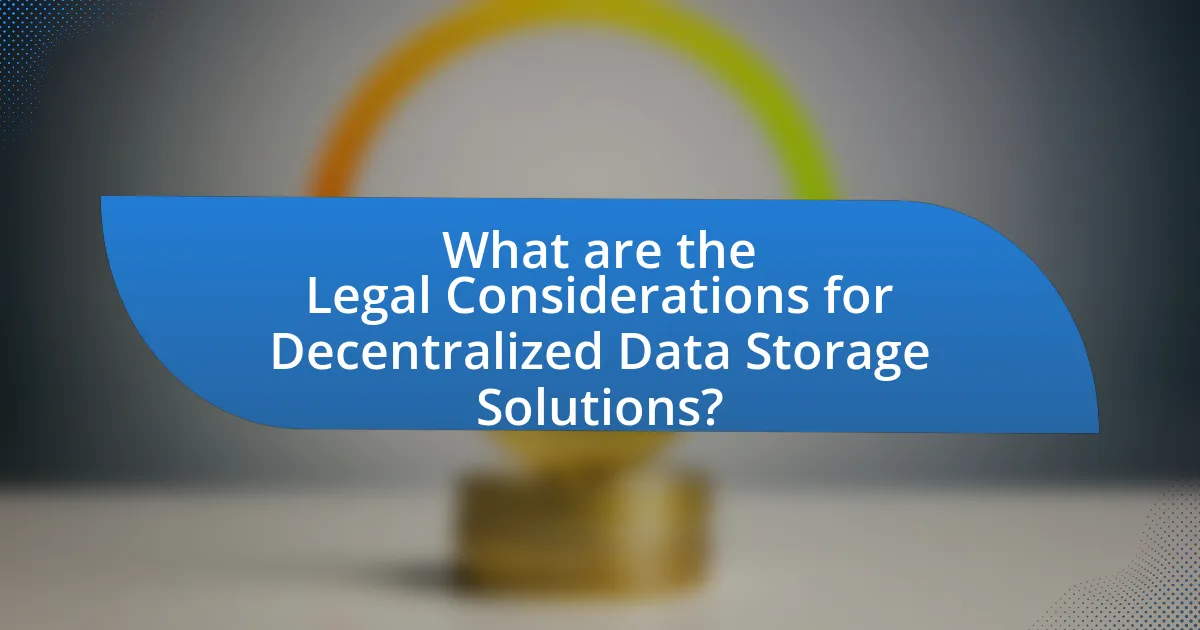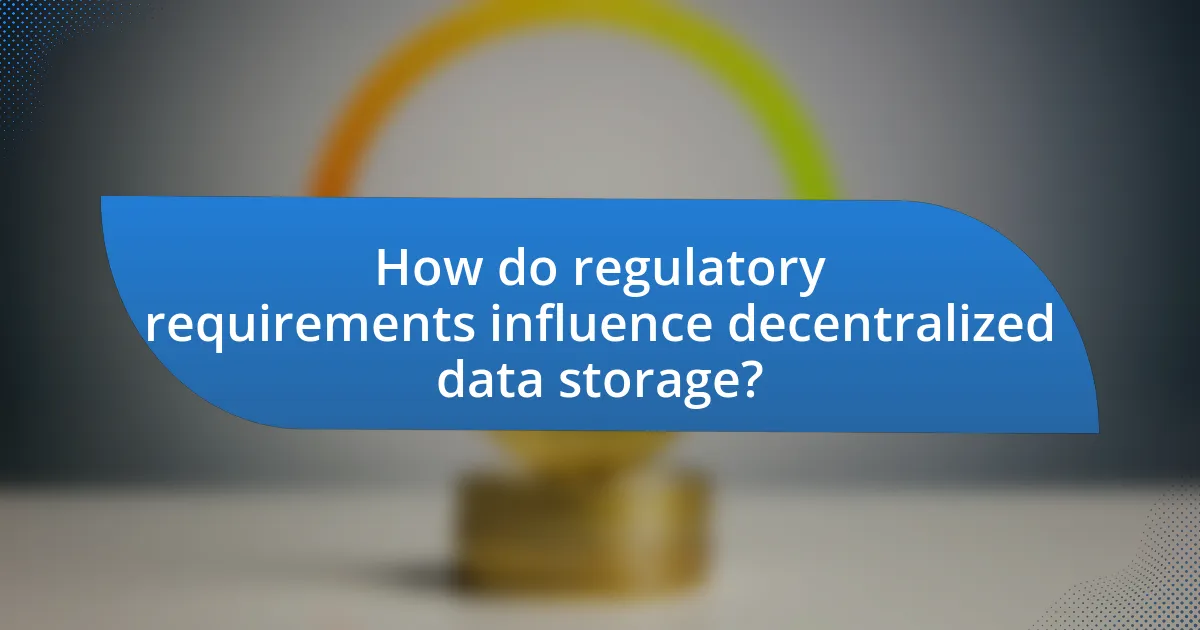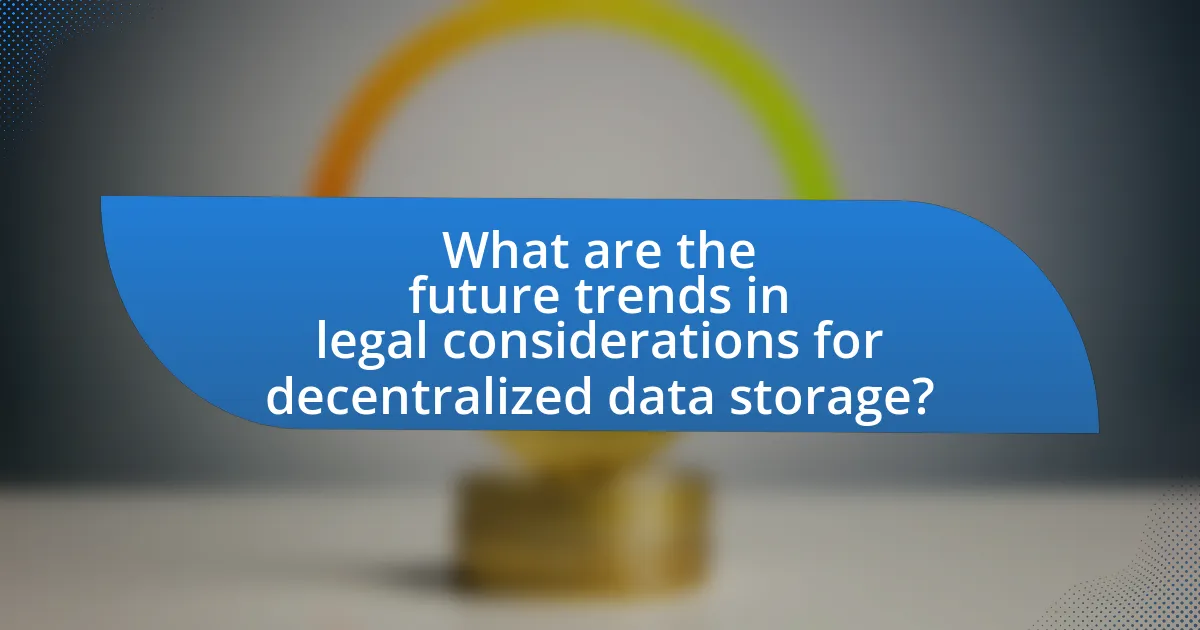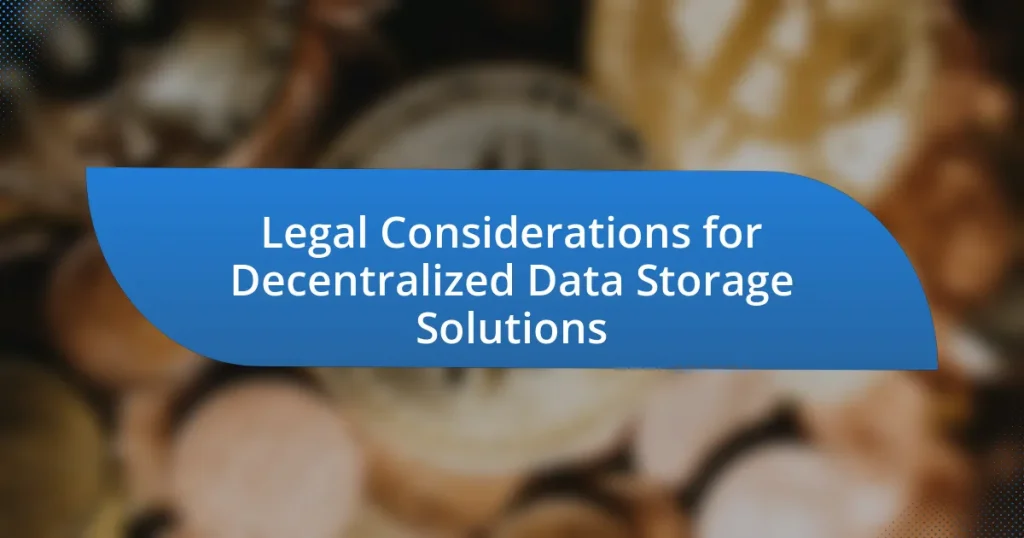The article focuses on the legal considerations surrounding decentralized data storage solutions, emphasizing the complexities of compliance with data protection regulations, intellectual property rights, and liability issues. It highlights the challenges posed by jurisdictional differences, particularly in relation to the General Data Protection Regulation (GDPR) and other relevant laws such as HIPAA and CCPA. Key topics include the implications of data ownership, the role of contracts and smart contracts, and the necessity for organizations to implement robust compliance strategies to navigate the evolving legal landscape effectively. The article also discusses future trends in regulation and the importance of international cooperation in harmonizing legal frameworks for decentralized technologies.

What are the Legal Considerations for Decentralized Data Storage Solutions?
Legal considerations for decentralized data storage solutions include compliance with data protection regulations, intellectual property rights, and liability issues. Decentralized systems often store data across multiple jurisdictions, which complicates adherence to laws such as the General Data Protection Regulation (GDPR) in Europe, requiring organizations to ensure that personal data is processed lawfully and securely. Additionally, ownership and control of data can lead to disputes over intellectual property rights, as decentralized storage may obscure the original creator’s identity. Liability concerns arise when data breaches occur, as it can be challenging to determine responsibility in a decentralized framework. These factors necessitate careful legal planning and risk assessment to navigate the complexities of decentralized data storage effectively.
Why is understanding legal considerations important for decentralized data storage?
Understanding legal considerations is crucial for decentralized data storage because it ensures compliance with regulations and protects users’ rights. Decentralized data storage often involves multiple jurisdictions, making it essential to navigate laws such as data protection, privacy, and intellectual property. For instance, the General Data Protection Regulation (GDPR) in the European Union imposes strict requirements on data handling and user consent, which decentralized systems must adhere to in order to avoid significant fines. Additionally, understanding legal frameworks helps mitigate risks associated with data breaches and liability, ensuring that organizations can operate securely and responsibly in a decentralized environment.
What legal frameworks govern data storage solutions?
Legal frameworks governing data storage solutions include the General Data Protection Regulation (GDPR) in the European Union, the Health Insurance Portability and Accountability Act (HIPAA) in the United States, and the California Consumer Privacy Act (CCPA) in California. These regulations establish requirements for data protection, privacy, and security, mandating that organizations implement measures to safeguard personal data and ensure compliance with legal standards. For instance, GDPR imposes strict guidelines on data processing and storage, requiring organizations to obtain explicit consent from individuals before collecting their data. Similarly, HIPAA sets forth regulations for the handling of protected health information, while CCPA grants California residents specific rights regarding their personal data.
How do jurisdictional issues impact decentralized data storage?
Jurisdictional issues significantly impact decentralized data storage by creating legal complexities regarding data ownership, access, and compliance with local laws. Different countries have varying regulations concerning data privacy, security, and sovereignty, which can lead to conflicts when data is stored across multiple jurisdictions. For instance, the General Data Protection Regulation (GDPR) in the European Union imposes strict rules on data handling, requiring organizations to ensure that data of EU citizens is processed in compliance with EU laws, regardless of where the data is stored. This can complicate decentralized systems, as they may not have a centralized authority to enforce compliance across different legal frameworks. Additionally, jurisdictional disputes can arise when law enforcement agencies seek access to data stored in a decentralized manner, leading to challenges in determining which legal system applies.
What are the key legal challenges faced by decentralized data storage solutions?
Decentralized data storage solutions face several key legal challenges, primarily related to data privacy, jurisdiction, and compliance with regulations. Data privacy issues arise because these systems often store personal information across multiple locations, complicating adherence to laws like the General Data Protection Regulation (GDPR), which mandates strict data handling and user consent protocols. Jurisdictional challenges occur as data may be stored in various countries, each with different legal frameworks, making it difficult to determine which laws apply. Compliance with regulations such as the Health Insurance Portability and Accountability Act (HIPAA) for healthcare data or the Children’s Online Privacy Protection Act (COPPA) for data involving minors further complicates the legal landscape. These challenges necessitate careful navigation to ensure that decentralized storage solutions operate within legal boundaries while protecting user rights.
How does data privacy legislation affect decentralized storage?
Data privacy legislation significantly impacts decentralized storage by imposing strict compliance requirements on how data is collected, stored, and processed. For instance, regulations like the General Data Protection Regulation (GDPR) mandate that organizations ensure data subjects’ rights, such as the right to access and the right to be forgotten, which can complicate the immutable nature of decentralized storage systems. These systems often lack a central authority to manage data deletion requests, potentially leading to non-compliance with such regulations. Additionally, decentralized storage solutions must implement robust encryption and data protection measures to safeguard personal data, aligning with legal standards to avoid penalties.
What are the implications of data ownership in decentralized systems?
Data ownership in decentralized systems implies that individuals retain control over their personal data, which can enhance privacy and security. This shift from centralized control to individual ownership reduces the risk of data breaches and misuse by third parties, as users can manage their own data without relying on a central authority. Furthermore, decentralized systems often utilize blockchain technology, which provides transparency and immutability, ensuring that data ownership is verifiable and tamper-proof. The implications also extend to legal frameworks, as existing laws may need to adapt to recognize individual ownership rights in these systems, potentially leading to new regulations that protect users while fostering innovation in data management.
What role do contracts play in decentralized data storage solutions?
Contracts serve as the foundational legal framework in decentralized data storage solutions by establishing the terms of service, responsibilities, and rights of all parties involved. These contracts ensure that data owners retain control over their information, while also outlining the obligations of storage providers regarding data security, access, and compliance with regulations. For instance, smart contracts, which are self-executing agreements with the terms directly written into code, automate processes and enforce compliance without the need for intermediaries, thereby enhancing trust and efficiency. The use of contracts in this context is validated by the increasing adoption of blockchain technology, which inherently relies on contractual agreements to facilitate secure and transparent transactions.
How can smart contracts be utilized in legal agreements?
Smart contracts can be utilized in legal agreements by automating the execution and enforcement of contract terms through blockchain technology. This automation ensures that once predefined conditions are met, the contract executes automatically, reducing the need for intermediaries and minimizing the risk of disputes. For instance, in real estate transactions, a smart contract can automatically transfer ownership upon receipt of payment, ensuring transparency and security. The immutability of blockchain records further enhances trust, as all parties can verify the contract’s terms and execution history.
What are the enforceability issues related to contracts in decentralized environments?
Enforceability issues related to contracts in decentralized environments primarily stem from the lack of a centralized authority to oversee and enforce agreements. In decentralized systems, such as blockchain, the anonymity of participants complicates the identification of parties involved, making it difficult to hold them accountable for breaches. Additionally, the immutability of transactions can hinder the ability to amend contracts or resolve disputes, as traditional legal frameworks may not apply effectively. Furthermore, jurisdictional challenges arise since decentralized networks operate globally, leading to conflicts between different legal systems. These factors collectively create significant hurdles in ensuring that contracts are enforceable in decentralized environments.

How do regulatory requirements influence decentralized data storage?
Regulatory requirements significantly influence decentralized data storage by imposing compliance obligations that affect data management practices. For instance, regulations such as the General Data Protection Regulation (GDPR) in Europe mandate that organizations ensure data privacy and protection, which can complicate the use of decentralized systems where data control is distributed. Additionally, compliance with laws like the Health Insurance Portability and Accountability Act (HIPAA) in the United States requires stringent security measures for sensitive health information, impacting how decentralized storage solutions are designed and implemented. These regulations necessitate that decentralized data storage solutions incorporate features such as data encryption, access controls, and audit trails to meet legal standards, thereby shaping the architecture and operational protocols of these systems.
What regulations must be considered for compliance?
Decentralized data storage solutions must comply with regulations such as the General Data Protection Regulation (GDPR), the Health Insurance Portability and Accountability Act (HIPAA), and the California Consumer Privacy Act (CCPA). GDPR mandates strict data protection and privacy standards for individuals within the European Union, requiring organizations to implement measures for data security and user consent. HIPAA establishes requirements for safeguarding medical information in the United States, ensuring that healthcare data is stored and transmitted securely. CCPA provides California residents with rights regarding their personal information, including the right to know what data is collected and the right to delete it. Compliance with these regulations is essential to avoid legal penalties and to protect user privacy.
How do GDPR and other data protection laws apply to decentralized storage?
GDPR and other data protection laws apply to decentralized storage by imposing obligations on data controllers and processors, regardless of the storage architecture. Under GDPR, entities that determine the purposes and means of processing personal data must ensure compliance with principles such as data minimization, purpose limitation, and user consent, even when data is stored in a decentralized manner. For instance, if a decentralized storage solution involves personal data, the organization using that solution must implement appropriate technical and organizational measures to protect that data, as mandated by Article 32 of GDPR. Additionally, the decentralized nature of storage does not exempt entities from the requirement to provide transparency to users about data processing activities, as outlined in Articles 13 and 14 of GDPR. Therefore, compliance with data protection laws remains essential, irrespective of the technological framework employed for data storage.
What are the reporting requirements for decentralized data storage solutions?
Decentralized data storage solutions must comply with various reporting requirements that vary by jurisdiction and regulatory framework. These requirements often include data protection and privacy regulations, such as the General Data Protection Regulation (GDPR) in the European Union, which mandates that organizations report data breaches within 72 hours and maintain records of processing activities. Additionally, decentralized solutions may need to adhere to industry-specific regulations, such as the Health Insurance Portability and Accountability Act (HIPAA) for healthcare data, which requires reporting of any unauthorized access to protected health information. Compliance with these regulations ensures accountability and transparency in data handling practices.
How can organizations ensure compliance with legal standards?
Organizations can ensure compliance with legal standards by implementing robust compliance programs that include regular audits, employee training, and adherence to relevant regulations. These programs should be tailored to the specific legal requirements applicable to the organization’s industry, such as data protection laws like GDPR or HIPAA. Regular audits help identify compliance gaps, while employee training ensures that staff are aware of legal obligations and best practices. For instance, a study by the Ponemon Institute found that organizations with comprehensive compliance training programs experience 50% fewer data breaches, highlighting the effectiveness of such initiatives in maintaining legal compliance.
What best practices should be followed for legal compliance?
To ensure legal compliance, organizations should implement a comprehensive data governance framework that includes regular audits, adherence to relevant regulations, and employee training on compliance policies. Regular audits help identify potential legal risks and ensure that data handling practices align with laws such as the General Data Protection Regulation (GDPR) and the Health Insurance Portability and Accountability Act (HIPAA). Adhering to these regulations is crucial, as non-compliance can result in significant fines; for instance, GDPR violations can lead to penalties of up to 4% of annual global turnover. Additionally, training employees on compliance policies fosters a culture of accountability and awareness, reducing the likelihood of inadvertent breaches.
How can legal audits be conducted for decentralized data storage solutions?
Legal audits for decentralized data storage solutions can be conducted by establishing a framework that assesses compliance with applicable laws and regulations. This involves identifying the legal requirements relevant to data protection, privacy, and security, such as the General Data Protection Regulation (GDPR) in Europe or the Health Insurance Portability and Accountability Act (HIPAA) in the United States.
Auditors must evaluate the architecture of the decentralized system to ensure that data handling practices align with these regulations. This includes examining data access controls, encryption methods, and user consent mechanisms. Additionally, auditors should review the smart contracts governing data transactions to ensure they comply with legal standards.
To validate compliance, auditors can utilize tools and methodologies such as blockchain analysis and forensic audits, which provide insights into data integrity and traceability. These methods help confirm that data is stored and processed in accordance with legal obligations, thereby ensuring accountability and transparency in decentralized environments.

What are the future trends in legal considerations for decentralized data storage?
Future trends in legal considerations for decentralized data storage include increased regulatory scrutiny, the emergence of data sovereignty laws, and the need for compliance with privacy regulations such as GDPR. Regulatory bodies are likely to focus on how decentralized systems manage data ownership and user consent, as traditional frameworks struggle to address the complexities of distributed networks. Data sovereignty laws will require organizations to store data within specific jurisdictions, impacting how decentralized storage solutions are designed and implemented. Additionally, as privacy concerns grow, adherence to regulations like GDPR will necessitate robust mechanisms for data protection and user rights, influencing the development of decentralized technologies.
How is the legal landscape evolving for decentralized technologies?
The legal landscape for decentralized technologies is evolving through increased regulatory scrutiny and the development of specific legal frameworks. Governments and regulatory bodies are beginning to establish guidelines that address issues such as data privacy, security, and compliance with existing laws. For instance, the European Union’s General Data Protection Regulation (GDPR) has implications for decentralized data storage, requiring organizations to ensure that personal data is processed in compliance with privacy rights. Additionally, countries like the United States are exploring legislation that could impact the use of blockchain and decentralized applications, focusing on consumer protection and financial regulations. This shift indicates a growing recognition of the need for legal clarity in the rapidly advancing field of decentralized technologies.
What emerging laws and regulations should be monitored?
Emerging laws and regulations that should be monitored include data privacy laws, such as the General Data Protection Regulation (GDPR) in Europe and the California Consumer Privacy Act (CCPA) in the United States. These regulations impact how decentralized data storage solutions handle personal data, requiring compliance with strict consent and data protection standards. Additionally, regulations related to blockchain technology, such as the Financial Action Task Force (FATF) guidelines on virtual assets, are crucial as they address anti-money laundering (AML) and counter-terrorism financing (CTF) measures. Monitoring these laws is essential for ensuring that decentralized data storage solutions operate within legal frameworks and avoid potential penalties.
How might international cooperation affect decentralized data storage regulations?
International cooperation can significantly harmonize decentralized data storage regulations across different jurisdictions. By collaborating, countries can establish common standards and frameworks that address issues such as data privacy, security, and user rights, which are often inconsistent in national laws. For instance, the General Data Protection Regulation (GDPR) in the European Union has influenced global data protection practices, prompting countries to align their regulations with similar principles to facilitate cross-border data flows. This alignment can reduce legal ambiguities and compliance burdens for organizations operating in multiple regions, ultimately fostering innovation and trust in decentralized data storage solutions.
What practical steps can organizations take to navigate legal considerations?
Organizations can navigate legal considerations by implementing comprehensive compliance programs that include regular audits, employee training, and legal consultations. These programs ensure adherence to relevant laws and regulations, such as data protection and privacy laws, which are critical for decentralized data storage solutions. For instance, organizations should conduct risk assessments to identify potential legal vulnerabilities and establish protocols for data handling that align with regulations like the General Data Protection Regulation (GDPR). Additionally, maintaining clear documentation of data processing activities and obtaining necessary consents from data subjects further supports legal compliance.
How can organizations develop a legal compliance strategy for decentralized data storage?
Organizations can develop a legal compliance strategy for decentralized data storage by conducting a comprehensive risk assessment to identify applicable regulations, such as GDPR or HIPAA, that govern data protection and privacy. This assessment should include an evaluation of data residency requirements, as decentralized storage often involves multiple jurisdictions, which can complicate compliance.
Furthermore, organizations should implement robust data governance frameworks that outline data handling procedures, access controls, and incident response plans tailored to decentralized environments. Regular audits and compliance checks are essential to ensure adherence to legal standards and to adapt to evolving regulations.
Additionally, training employees on compliance obligations and the specific challenges of decentralized data storage can enhance awareness and accountability. By integrating these elements, organizations can create a proactive legal compliance strategy that effectively addresses the complexities of decentralized data storage.
What resources are available for staying informed about legal changes in decentralized storage?
Legal professionals and organizations can stay informed about legal changes in decentralized storage through various resources. Key resources include legal journals such as the Harvard Law Review, which publishes articles on technology and law, and websites like the Electronic Frontier Foundation, which provides updates on digital rights and privacy laws. Additionally, industry reports from organizations like the International Association for Privacy Professionals offer insights into evolving regulations. Following relevant legal blogs and subscribing to newsletters from law firms specializing in technology law also provide timely updates on legal developments in decentralized storage.


